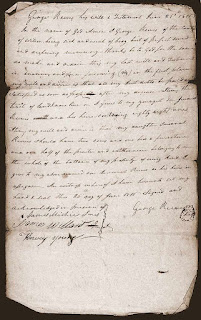Thomas Bird Reeves settled in Dunklin County, Missouri in 1859. He was the son of
William T. Reeves (originally spelled Reves) and Michal* Hoskins of Halifax County, Virginia born on the 26th February, 1819. In 1829, his father died leaving a widow and seven children.
 |
| Thomas Bird Reeves |
After William’s death, Michal Hoskins Reeves took her seven children and migrated west into Tennessee along with her family where her father, Thomas C. Hoskins died around July of 1839 in Rutherford County, Tennessee.
It was in Rutherford County that Thomas Bird Reeves married Louisa E. Ford in 1848. The extended Reeves’ family then moved on to Gibson County in northwestern Tennessee where several of his sisters married as did his brother
Peter May Reeves.
By the census of 1860, Thomas and his family were recorded in the census of Dunklin County, Missouri. The majority of his extended family remained in Milan, Gibson County, Tennessee, where his mother Michal Hoskins Reeves died in 1878. Thomas Bird Reeves lived in Dunklin County, Missouri for the next forty years where his children and grandchildren grew up and married. According to his biography published in
The History of Dunklin County, Missouri - "Uncle Tommie, as he is affectionately called, owned and occupied one of the first business houses in Malden but has been principally a farmer." Some years after Thomas moved across the Mississippi River into Missouri, his brother Peter migrated to Greene County, Arkansas which is just across the state line from Dunklin County.
Obituary of Thomas Bird Reeves published in the Weatherford Democrat of Parker County, Texas on the 9th January, 1896:
Thos. B. Reeves died last Sunday morning, Jan. 5th, near Greenwood, aged 76 years, of general debility or paralysis. He was sick only about 36 hours. He moved to this county from Missouri last November. He has been a member of the Missionary Baptist church since 1862. He was a member of the Cotton Hill lodge No. 306, I.O.O.F. of Missouri since 1874. His remains were interred in the Greenwood cemetery Monday, under the auspices of the Odd Fellows of this city. Rev. Mr. Tenison of the Greenwood settlement preached the funeral discourse in the house of the deceased’s son, where Mr. Reeves died.

The above photo contains members of Thomas Bird Reeves family - (Back Row) Tom Sipes, Belle Keedy Stevens holding Herbert Stevens Jr, Charles F. Moore; (Front Row) Louisa E. Ford Reeves, widow of Thomas Bird Reeves, Minnie Stevens Sipes holding Rosina Sipes, Lou Reeves Moore, Bernice Stevens and Clara Stevens.
My own grandfather,
William Hubbard Reeves, was born in Ballard County, Kentucky and also migrated across the Mississippi River into New Madrid County, Missouri as an adult. I often wonder if he might have been aware that he was closely related to these Reeves’ cousins who lived just a few counties away.
* Although Thomas Bird Reeves' mother's name is spelled many different ways, i.e. Michell, Michael, and various other variations, I happened upon a document in the Chancery Court Cases at the Library of Virginia relative to the probate of her deceased husband's estate that had an original signature where she clearly signed her name as "Michal Reves".
(Many, many thanks to Sarah McEachern for the photos of Thomas Bird Reeves and his family.)







